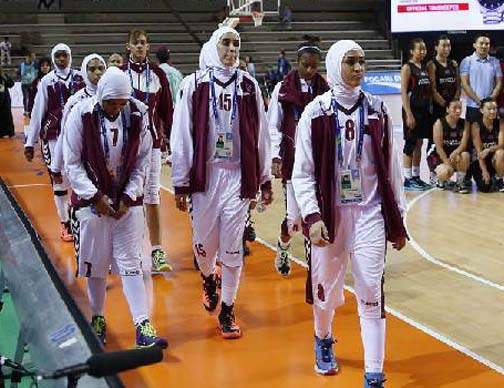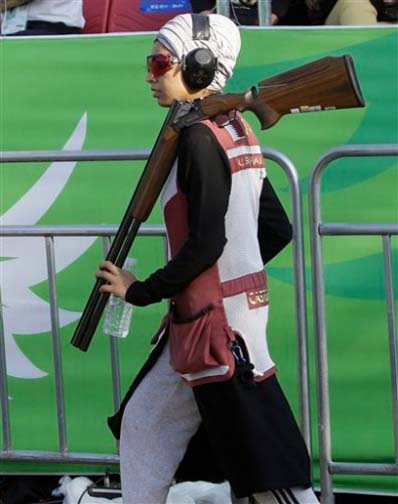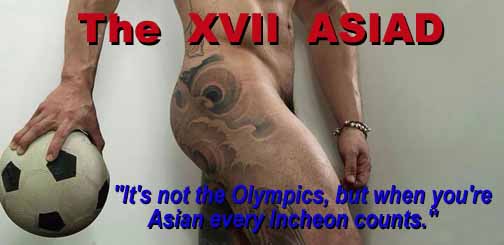Tags
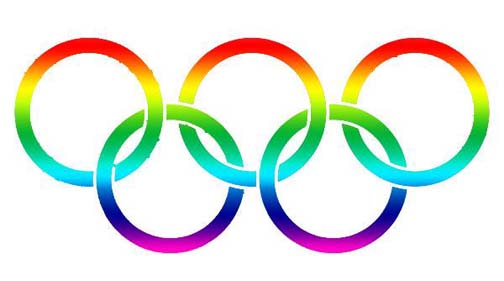
Better late than never, the International Olympic Committee has decided to require future host cities to adhere to the non-discrimination clause of its charter.
The good news is the International Olympic Committee (IOC) announced on September 24, 2104 it would add a new non-discrimination clause to its host city contract that would uphold Principle 6 of the Olympic Charter which states, “Any form of discrimination with regard to a country or a person on grounds of race, religion, politics, gender or otherwise is incompatible with belonging to the Olympic Movement.” Gay rights activists used Principle 6, which was already part of the IOC’s charter, to protest discrimination against gays in Russia during the Sochi Winter Games.
Christopher Dubi, the IOC Sports Director, says the new clause will include “the prohibition of any form of discrimination, using the wording of Fundamental Principle 6 of the Olympic Charter.” Under the new clause future host cities must abide by international human rights standards in order to host the games, including the protection of lesbian, gay, bisexual and transgender citizens and athletes. The IOC stated that the changes to the host city contract “are the result of the experience gained by the IOC in previous editions of the Olympic Games.” Uh, that would be you Mr. Putin.
The bad news is the IOC’s timing, which served as a not-so timely reminder that The Olympic Council of Asia (OCA), which runs the Asian Games, falls under the banner of the IOC and is required to adhere to all of its rules, regulations, and principles, as are all Host City Organizing Committees, which in turn must adhere to the rules, regulations, and charter of the OCA. Not that when it comes to the gays that’s much of a problem for South Korea where the current Games are playing out. It could, however, become an issue for the 2018 Games in Indonesia. Jakarta will be the host city and while Indonesia’s capital city is not in one of the provinces under Sharia law – one of which recently proposed legislation for punishing gays by caning – in Jakarta lesbian, gay, bisexual and transgender people are legally labeled as “cacat” or mentally handicapped and are therefore not protected by the various legal rights guaranteed by the constitution to all other citizens.
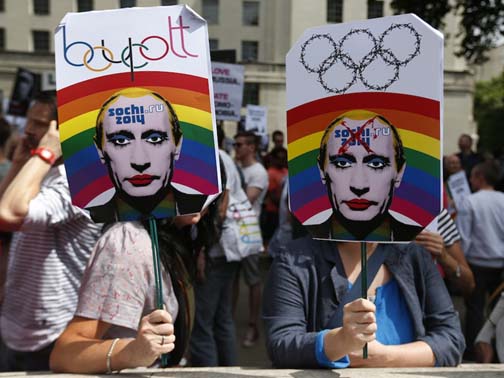
While not naming names, the IOC says its decision to require host cities not discriminate against gays is based on “experience gained by the IOC in previous editions of the Olympic Games.” Huh.
As for the Olympic Games, neither Brazil, the host nation for the 2016 Games, nor Japan, the host nation for the 2020 Olympics is a problem. Same-sex sexual activity was legalized in Japan in 1880 and in Brazil gays enjoy many of the same legal protections available to breeders, including the right to marry their same-sex partner. But there is discrimination and then there’s discrimination. And there are two separate actions taken by the Incheon Asian Games Organizing Committee (IAGOC) against which the OCA, in light of the IOC’s announcement, is now calling foul. For the Incheon Games it may be a case of too little too late, but how the IOC and OCA go about enforcing their charter will set a precedence for future games, which may have an impact on Jakarta in 2018.
The first controversy revolves around the Association of Tennis Professionals (ATP), one of the many International Federations (IF) that govern individual sports. In this case there is a bit of a catch-22 going on. The Olympic charter recognizes and accepts that it is the IF which establishes the eligibility criteria of the relevant sport. However, it is incumbent upon the IF to do so in accordance with the Olympic charter.
The issue at the Incheon Games is that the ATP has a rule stating that players cannot be entered into more than one tournament in the same tournament week. The 17th Asian Games schedule for men’s tennis overlap the China Open in Beijing by one day. The China Open is jointly organized by the ATP and the Women’s Tennis Association (WTA), and the WTA agreed to be flexible and allow players to report to China later or even withdraw to focus on the Asian Games. But the ATP rejected any such concessions. This forced six of the world’s leading male tennis players to withdraw from the Asian Games out of fear of facing a three-year ban and a $100,000 by the ATP.
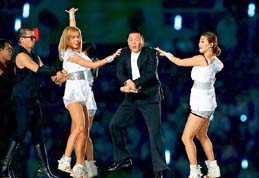
If someone needed to be banned from the Incheon Games, it shoulda been Psy from performing Gangnam Style at the opening ceremonies.
The tennis controversy, and a similar problem with the Incheon Asian Games Organizing Committee denying the eligibility of NBA player Andray Blatche to compete on the Philippines’ team, was addressed in the OCA’s statement, which amounted to a tongue lashing. The strongly worded statement reminded sports governing bodies to protect the rights of athletes. “The right of the athletes must be the highest priority,” said OCA Director General Husain Al-Musallam. “Every athlete has the right to represent their country’s flag without discrimination or without the threat of a financial penalty.”
The OCA also criticized the Incheon Asian Games Organizing Committee for what it called “preventing athletes from representing their countries an international event”, although according to a spokesperson for the IAGOC the problem is with the International Basketball Federation (FIBA) and not the IAGOC. At issue is FIBA’s rule regarding the wearing of headgear. In this case that headgear is the hijab, a head covering worn by Muslim women in respect to their religion. While competitors have been allowed to wear hijabs in other sports, including badminton, shooting, and track and field at the Asian Games, in accordance with FIBA’s rules in Basketball they are not.
Asian Games Organizing Committee spokeswoman Anna Jihyun You told The Associated Press that ten minutes after the scheduled start of the match between Qatar and Mongolia on September 24, the game was declared forfeited and awarded to Mongolia because the Qatari players refused to take off their hijab. Ms. You said match officials did not receive any instructions to allow head coverings, and were only following the rules which restrict the use of headgear, hair accessories, and jewelry.
The Qatar women said they had expected to be able to wear a hijab when they arrived in Korea and only found out when they arrived at the Incheon stadium that it was still banned. “This is an insult to us, they did not respect our religion,” said Qatar forward Refaa Morjan Mohammed, adding that the team had worn the head scarf in Arab Championships without problems. The Qatar squad has five players who wear a hijab and six who do not.
But the International Basketball Federation (FIBA) strongly denied there was any religious connotation in the longstanding ban. It say the rule in question is over twenty years old and only recently has been questioned. FIBA is currently allowing exemptions to the rule, upon request, for a two-year trial period but only at the national level. FIBA’s governing body says it will evaluate the rule again next year, and determine whether to allow head covers at some level of international competition from next summer forward. Meanwhile, Qatar forfeited an additional match against Nepal, and has since announced that the country’s women’s basketball squad was withdrawing from the Games.
The OCA’s statement chastising IFs said the federations “have the duty to protect their athletes and allow them to exercise their right of freedom of choice with dignity.” The OCA also published a copy of two key points in the Olympic Charter and urged the sporting bodies to consider them. “The goal of Olympism is to place sport at the service of the harmonious development of humankind, with a view to promoting a peaceful society concerned with the preservation of human dignity. “Any form of discrimination with regard to a country or a person on grounds of race, religion, politics, gender or otherwise is incompatible with belonging to the Olympic Movement.
While the specific issues involved with current problems at the Incheon Games stem from international federation rules, and not the laws of the host country as gay rights issues did at the Sochi Olympics, the 17th Asian Games is an opportunity for the IOC to show how seriously it takes its decision to require all governing bodies associated with the sports world under its guidance to adhere to Olympic principles and its charter. FIBA’s claim that its rule that prevents Muslim women from adhering to the dictates of their religion is a matter of procedure and not religious discrimination should hold no more water than Russia’s claim that it does not discriminate against its gay citizens, but only wants to protect the country’s youth.
[‘The XVII Asiad’ are a series of posts about hot competitors and general articles about the 2014 17th Asian Games of interest to gay men. So, yeah, lots of hot male eye candy. Click the XVII Asiad’ graphic below for additional news, stories, and pictures.]

